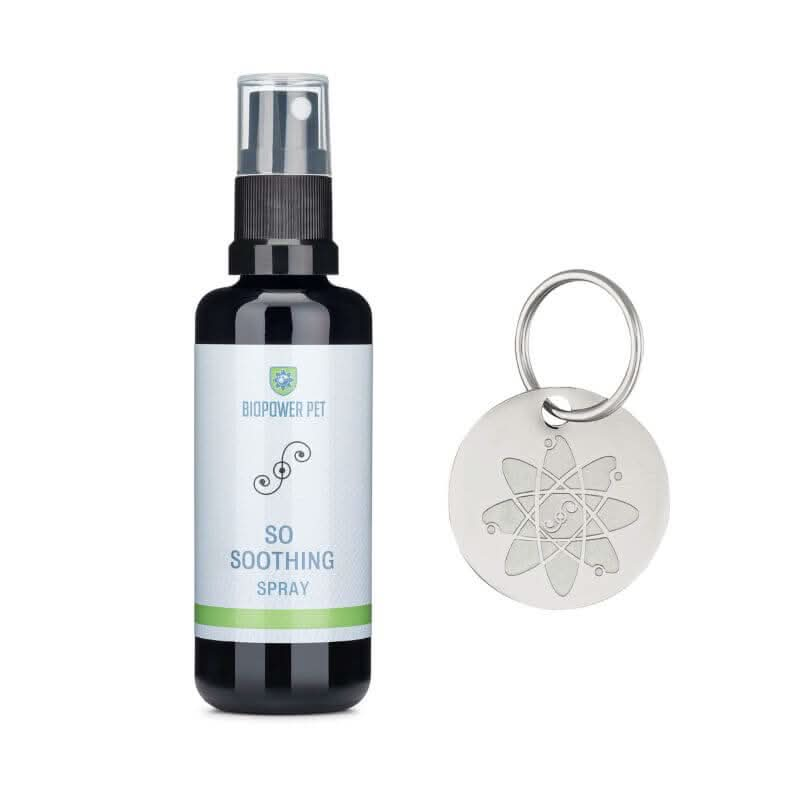Allergy Relief For Dogs
As every dog owner knows, our four-legged companions are more than just pets—they're family. When the seasonal change approaches or environmental factors shift, some dogs show signs of allergies like itching, sneezing, or paw licking. These symptoms not only cause discomfort but can also affect their overall well-being.
Common Dog Allergy Symptoms: Is Your Pet Suffering?
Understanding and identifying common allergy symptoms in your dog is the first step toward effective management and relief. Dogs, much like humans, can showcase a variety of signs indicating they might be suffering from allergies. Key symptoms to watch out for include:
- Excessive Itching: If your dog constantly scratches itself, it may be more than an occasional itch. Persistent itching can lead to skin abrasions and secondary infections.¹
- Red or Inflamed Skin: Allergies often manifest as redness or inflammation in the skin, particularly noticeable around the paws, abdomen, and face.
- Frequent Sneezing: While sneezing is common in dogs, consistent sneezing could indicate an allergic reaction.
- Paw Licking: Excessive licking or chewing of paws can be a telltale sign of allergies, as dogs attempt to soothe itchy or irritated skin.¹
- Watery Eyes: Constant tear production or discharge from the eyes is another common symptom of allergic reactions in dogs.²
- Ear Infections: Recurring ear infections might signal an underlying allergy.³ Look for persistent head shaking or a bad odor emanating from the ears.
What Causes Allergies In Dogs? Identifying The Triggers
Allergies in dogs are primarily caused by a hypersensitive immune response to certain substances in their environment. Understanding these triggers is crucial in managing and alleviating your pet's discomfort.
Environmental Allergens
Dogs can be sensitive to seasonal or year-round allergens such as pollen, dust mites, mold spores, and grass. These can lead to symptoms like sneezing, itching, and red, inflamed skin.
Food Allergens
Common food allergens include proteins like beef, chicken, and dairy. Some dogs may be intolerant to grains such as wheat or corn, resulting in gastrointestinal issues or skin reactions.
Flea Allergies
Flea allergy dermatitis is a specific sensitivity to flea saliva. A few flea bites can cause severe itching, leading to scratching, biting, and secondary skin infections.⁴
Contact Allergens
Products in your home, such as cleaning supplies, shampoos, or fabrics, can cause allergic reactions. Detecting these can be tricky but are typically identified by itchiness localized to areas directly contacting the allergen.
The Impact Of Allergies On Your Dog's Health
Allergies can significantly diminish a dog's quality of life, affecting their physical and mental well-being. Understanding the potential impact is crucial for responsible pet ownership. Left untreated, allergies can lead to secondary infections and chronic discomfort.
Skin And Coat Issues
Allergic reactions often manifest as skin problems. Constant scratching, licking, and chewing can cause hot spots, hair loss, and open wounds, making the dog susceptible to bacterial and fungal infections. Chronic skin irritation can also lead to thickening and darkening skin.⁵
Digestive Disturbances
Food allergies, in particular, can cause significant gastrointestinal distress. Symptoms like vomiting, diarrhea, and abdominal discomfort can lead to dehydration and malnutrition. Chronic digestive issues can also affect the dog's ability to absorb essential nutrients, impacting their overall health.
Ear Infections And Respiratory Problems
Allergies can cause inflammation in the ear canals, leading to recurrent ear infections. These infections are painful and can lead to hearing loss if left untreated. In some cases, allergies can also cause respiratory problems, such as sneezing, coughing, and difficulty breathing, especially in dogs with environmental allergies.
Untreated allergies can have a major impact on your dog's health and happiness. Addressing symptoms early with proper care can help prevent long-term complications and improve your dog's quality of life.

Best Allergy Relief For Dogs: Top Products That Work
Regarding providing holistic and natural allergy relief for our furry companions, BioPower Pet offers some truly standout solutions. Our commitment to addressing the root cause of allergies with innovative, chemical-free products makes us a trusted name among pet owners seeking effective remedies. Let's explore top offerings that ensure your pet’s comfort and well-being.
The Biopower Pet So Soothing Spray
This topical solution combines bioenergetic-enhanced spring water with the natural benefits of citronella essential oil. The So Soothing Spray helps to relieve episodic flare-ups and irritated skin, targeting symptoms directly and swiftly. Its non-toxic, gentle formulation makes it suitable for regular use, allowing pet owners to confidently address itching or redness without worrying about harsh chemicals affecting their dog's health.
Biopower Pet So Soothing Tag
Utilizing advanced bio-resonance technology, the So Soothing Tag by BioPower Pet is specifically designed to support your pet's immune response consistently throughout the day. When affixed to your pet's collar, the Tag emits bioenergetic frequencies that help harmonize and strengthen the immune system, reducing symptoms such as itching, sneezing, and paw licking. This continuous support is particularly beneficial for pets that experience persistent or chronic allergy symptoms.
The Biopower Pet So Soothing Bundle
The So Soothing Bundle offers the combined benefits of the So Soothing Spray and Tag for a comprehensive approach to managing your dog's allergies. This duo ensures immediate relief and ongoing support, giving pet owners peace of mind that their beloved animal receives an all-encompassing treatment. The synergy of these products harnesses both the fast-acting and preventative aspects of allergy management, ensuring your pet enjoys maximum comfort year-round.
Diet And Nutrition Tips For Allergy-Prone Dogs
When seeking allergy relief for dogs, diet is crucial in managing symptoms and supporting overall health. Here are some essential tips to consider:
- Opt for High-Quality, Natural Ingredients: Choose dog food that lists real meats and wholesome vegetables as primary ingredients. Avoid artificial additives, preservatives, and fillers, which can exacerbate allergies or sensitivities.
- Consider Novel Proteins: For dogs with food allergies, switching to novel protein sources like duck, venison, or rabbit can be beneficial. These proteins are less commonly used in standard dog foods, potentially reducing allergic reactions.
- Introduce Probiotics: Probiotics promote gut health, which is linked to a stronger immune system and reduced allergic reactions. Look for foods that contain live cultures or supplements designed specifically for pets.
- Monitor for Food Sensitivities: Pay attention to any changes in your dog's symptoms when introducing new foods. An elimination diet, guided by your veterinarian, can help identify and avoid triggers.
Proper nutrition, combined with BioPower Pet's innovative solutions like the So Soothing Tag and Spray, can significantly alleviate allergy symptoms and improve your dog's quality of life. By harmonizing your diet with holistic treatments, you provide comprehensive care for your allergy-prone pet.
The Importance Of A Holistic Approach To Allergy Relief
When it comes to managing allergies in dogs, focusing on a holistic approach can yield the most effective and sustainable results. Unlike conventional methods that rely heavily on medications to suppress symptoms, a holistic strategy integrates natural solutions and considers your pet's overall health and well-being. This can lead to a more balanced immune system and long-term relief from allergy symptoms.
Addressing The Root Causes
Understanding and addressing the root causes of your dog's allergies is crucial for effective relief. Many factors contribute to allergic reactions, including environmental triggers, dietary sensitivities, and genetic predispositions.
By identifying these triggers, you can tailor a treatment plan that alleviates symptoms and prevents future flare-ups. BioPower Pet’s products, like the So Soothing Tag, harmonize your pet’s immune response through resonance, offering a proactive approach rather than merely masking symptoms.
Incorporating Natural Remedies
Natural remedies play a vital role in a holistic allergy relief plan. They tend to be gentler on your pet's system and have fewer side effects than conventional pharmaceuticals. For example, the So Soothing Spray from BioPower Pet, enriched with bioenergetic-enhanced spring water and citronella oil, provides ongoing comfort for irritated skin without harsh chemicals. Introducing such natural options can significantly enhance your pet’s comfort and overall quality of life.
Enhancing Lifestyle And Environment
Beyond immediate treatments, a holistic approach involves improving your dog’s lifestyle and environment to support their immune system. This might include optimizing their diet with nutritious, hypoallergenic food, maintaining regular grooming to minimize contact with allergens, and ensuring a clean, safe living space. Creating a supportive environment, you help strengthen your pet’s resilience to allergens, reducing the frequency and severity of allergic reactions.
Medications For Allergy Relief: When To See A Vet
While natural remedies can provide significant comfort and relief, there are situations when veterinary intervention and medications might be necessary for your dog's allergies. Understanding when to seek professional help ensures that your pet receives the most appropriate and effective treatment.
Recognizing Severe Allergy Symptoms
If your dog exhibits severe symptoms like relentless scratching, raw or bleeding skin, persistent ear infections, or unusual lethargy, it's crucial to consult a vet. These signs may indicate that over-the-counter solutions and natural remedies aren’t sufficient, and a tailored medication plan is needed to address the underlying causes effectively.
Prescription Medications
When natural solutions need support, veterinarians can offer a range of medications or even specialized allergy injections. These are designed to manage severe allergic reactions and provide your dog with quick, short-term relief while you address chronic conditions more thoroughly.
Working Together For Holistic Health
At BioPower Pet, we believe in a holistic approach, and sometimes, this means integrating conventional medicine with natural products. Partnering with your veterinarian allows you to craft a comprehensive plan that combines the advanced soothing capabilities of BioPower Pet solutions with the precision of veterinary care, ensuring optimal health and comfort for your pet.
Read also:
- Natural Supplements to Alleviate Anxiety in Nervous Pets
- Creating a Safe and Stress-Free Environment for Your Anxious Pet
- Holistic Approaches to Managing Itch and Allergies in Pets
Sources:
- Mahaney, P. (2015, September 2). 5 Common Reasons Your Dog is Scratching Himself. Petmd.com; PetMD. https://www.petmd.com/dog/slideshows/care/reasons-for-dog-scratching-himself
- Fries, W. C. (n.d.). Eye Discharge in Dogs. WebMD. https://www.webmd.com/pets/dogs/dog-discharge-from-eye
- 6 Common Ear Problems in Dogs: How To Identify, Diagnose, and Treat Them. (n.d.). Www.petmd.com. https://www.petmd.com/dog/general-health/common-ear-problems-dogs-how-to-identify-diagnose-treat
- Flea Allergy Dermatitis in Dogs. (n.d.). Vca_corporate. https://vcahospitals.com/know-your-pet/allergy-flea-allergy-dermatitis-in-dogs
- Dermatitis and Dermatologic Problems in Dogs - Dog Owners. (n.d.). MSD Veterinary Manual. https://www.msdvetmanual.com/dog-owners/skin-disorders-of-dogs/dermatitis-and-dermatologic-problems-in-dogs
Frequently asked question
Yes, dogs can indeed suffer from seasonal allergies similar to humans. Pollen, grass, mold spores, and other environmental factors typically trigger these allergies. If your dog exhibits increased scratching, licking, or sneezing during specific times of the year, seasonal allergies could be the cause.
Food allergens for dogs include beef, chicken, soy, wheat, dairy, and corn. If your dog shows signs of digestive distress, itchy skin, or ear infections after eating, it may be beneficial to examine its diet. Eliminating common allergens and introducing hypoallergenic meals can help pinpoint the source.
A food allergy elicits an immune response, typically resulting in symptoms such as hives, itching, and gastrointestinal distress. However, food intolerance does not involve the immune system and often manifests as digestive issues, like vomiting or diarrhea. Understanding this distinction is crucial for effective treatment.
If your dog displays persistent allergy symptoms, seeking veterinary assistance is essential. Chronic symptoms such as severe itching, uncontrolled scratching, noticeable hair loss, or recurrent ear infections should be evaluated by a professional to prevent further health complications.
While completely preventing allergies can be difficult, you can take several steps to minimize exposure. Regular grooming, a clean living environment, and a balanced, allergen-free diet can help reduce allergic reactions.
Some dogs may develop allergies that improve or resolve over time, especially with changes in diet or environment. However, many allergies require ongoing management.







